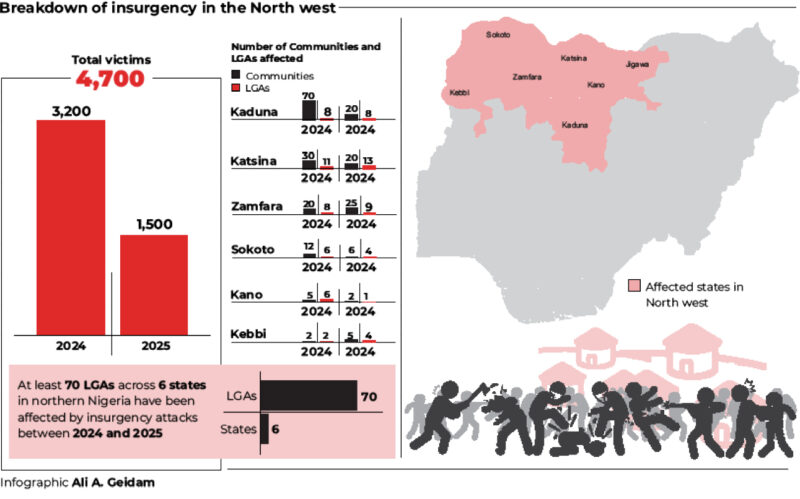At least 70 local government areas across six states in northern Nigeria have come under attacks between 2024 and 2025, a review of incidents has shown.
Data compiled by Daily Trust Library in the last two years show that at least 4,700 people have fallen victims to attacks by bandits, with 70 local government areas coming under heavy attacks.
The figure includes 3,200 in 2024 and 1,500 in 2025, excluding reports where casualty figures were not stated but only described as “many.”
SPONSOR AD
A state-by-state review of the data shows the widespread nature of the crisis. Kaduna recorded the highest number of affected local government areas and communities in both years.
In 2024, no fewer than 70 communities were attacked across 15 local government areas, including Kachia, Kajuru, Chikun and Birnin Gwari. The violence extended into 2025 with over 20 communities in 8 local government areas, such as Sanga, Kauru, Kagarko, Kachia, Kajuru and Kaura coming under attack.
Katsina State also featured prominently in the insurgency report in 2024 with more than 30 communities spread across 11 local government areas being attacked, including areas like Dutsinma, Kankara, Sabuwa and Jibia. The violence persisted into 2025 when at least 20 communities across 13 local government areas were affected, with Bakori, Faskari, Kankara and Dutsinma repeatedly mentioned.
The year-on-year data confirms Katsina as one of the worst-hit states, alongside Kaduna and Zamfara.
In Zamfara State, at least 20 communities across 8 local government areas were attacked in 2024. These included areas such as Gusau, Kaura Namoda, Maradun and Tsafe. The following year, the situation worsened as no fewer than 25 communities across 9 local government areas came under attack. Among the affected areas in 2025 were Bakura, Bukkuyum, Kaura Namoda, Shinkafi, Tsafe, Maru and Zurmi.
This spread shows Zamfara as one of the three epicentres of insurgency within the period under review.
Sokoto State recorded over a dozen affected communities across 6 local government areas in 2024, with Sabon Birni, Gudu, Wamakko and Yabo among those attacked. In 2025, insurgency continued to spread in the state with at least six communities across four local government coming under siege. Some of the local governments that featured again in 2025 include Dange Shuni, Sabon Birni and Wurno, confirming Sokoto’s continued exposure to the crisis.

Kano State, though less affected compared to Kaduna, Katsina and Zamfara, still experienced repeated incidents. In 2024, five communities were attacked across local government areas such as Warawa, Kano Municipal and Ungogo, with Hotoron Fulani and Sabuwar Gandu among those mentioned. The trend continued into 2025 when Farururwa village in Shanono and Zalairai in Gabasawa were listed among the communities attacked.
Kebbi was not spared as the data showed the trend in attacks in the state. In 2024, two incidents were recorded, including an attack along the Mairairai/Bena road in Danko Wasagu and another in Tambuwal Motor Park. In 2025, five communities across four local government areas were affected, with Ngaski, Danko Wasagu, Kalgo and Shanga mentioned in the records.
From the review, it is clear that Kaduna, Katsina and Zamfara bore the heaviest brunt of the attacks, accounting for more than 60 per cent of all affected communities and local government areas. Sokoto, Kano and Kebbi, though less impacted, still consistently appeared within the insurgency records across both years, confirming that no state in the North-West has been immune from the crisis.
In terms of victims, 2024 was far deadlier with 3,200 people recorded as killed, kidnapped or injured. The number dropped to 1,500 in 2025, but this figure covers only the first eight months of the year, and excludes incidents where reports simply stated that “many” were affected.
The records also showed a changing pattern of violence. While 2024 was characterised by large-scale killings and mass attacks across several local government areas at once, 2025 has so far been marked by more scattered assaults on smaller rural communities. This indicates a shift from widespread carnage to a more dispersed and sustained campaign of violence.
Although the year-on-year comparison shows a decline in casualty figures, the widespread and persistent nature of the attacks indicates that insurgency remains a major security challenge for the North-West.
These attacks persist even as millatary operative arrest kill many bandits and their leaders in the region.
Rise of banditry amidst peace deals in Katsina
In Katsina State, incessant attacks have moved largely to the Funtua zone while receding considerably in Katsina central. Residents in local government areas such as Kankara, Dutsinma, Faskari, Bakori, Funtua, Malumfashi, Matazu, Musawa and Dandume, as well as parts of Kurfi, are in constant fear of attacks, particularly in rural communities.
Many were killed or kidnapped on their farms in the past few months in almost all the affected local government areas.
Farming activities are largely hampered in these local government areas, and in some cases, levies imposed on residents by the bandits to allow them access to their farms. Some communities have given up hope and agreed to accommodate the bandits for their safety.
These problems, as observers said, had worsened cases of malnutrition and out-of-school children, which the government says it is taking steps to address.
Weekend Trust recalls that some local government areas, including Jibia, Batsari and Danmusa in the Katsina zone, were said to have entered into peace agreement with the bandits, thereby significantly reducing the spate of banditry attacks in the area, although not 100 per cent. For instance, only on Thursday, armed bandits attacked Daddara village in Jibia Local Government Area, according to the locals, killing one Malam Pate Baban Ila in his house. However, despite reported isolated cases, the rate of attacks has reduced compared with what obtained before the peace deals.
However, in Funtua zone, there is resurgence of attacks, killings, kidnapping and cattle rustling, which in many instances forced local communities to flee their homes and abandon their farmlands.
In one of the most recent incidents, bandits who were said to be on a reprisal attack killed over 50 people at Gidan Mantau, Malunfashi Local Government Area, including worshipers in the mosque and those who were burnt or gunned down in their homes.
The attackers also kidnapped about 76 people, including women and children, who were later released or rescued.
Before the recent mosque attack in Malumfashi Local Government Area, gunmen killed a headmaster of a primary school in Karfi village. Also, one Isa Ibrahim Liti was killed in KATARDA Quarters in Malumfashi town, even as two others – a father and his son – were abducted by gunmen.
It was also reported that a pregnant woman was arrested conveying arms and ammunition, although she was said to be allegedly ignorant of the content of the parcel she was carrying.
In Matazu Local Ggovernment Area, bandits killed one person in Gwarjo village; and it was reported that the bandits placed a N30 million levy on residents of Karaduwa village if they wanted to cultivate their farms peacefully.

In Dandume Local Government Area, a farmer was killed on his farm at Dabawa village while applying fertiliser on his farm.
In Faskari Local Government Area, a resident of Mairuwa told Weekend Trust that
people of the town and its environs lived in a state of terror due to attacks by bandits.
“Talking about the current situation, villages in the north and east of Mairuwa are empty due to this terror. Bandits have occupied these places and are now concentrated in the deserted villages.
“Now, you cannot walk one kilomemtre away from our village without encountering the terrorists. Currently, the people of Mairuwa are in a cage: we do not go out to look for food; people who have the courage and determination to fend for themselves now beg.
“Recently, they killed three of our people. Two of whom were Mairuwa residents and one was from Unguwar Maje. They also kidnapped five people, four from Mairuwa, one from Unguwar Maje. In addition, they killed some people in Tafoki and blocked the Tafoki-Funtua road in the past few days and stole people’s motorcycles,” he lamented.
Another resident who pleaded anonymity said, “As I speak to you, armed bandits are on their daily mission for killing, kidnapping and displacing people in neighbouring villages unchallenged. Almost all the villages around the Mairuwa/Tafoki axis in Faskari Local Government Area are displaced. Some of them are either taking refuge in our town or elsewhere. Some of the communities abandoned are Gidan Sule Doma; Gidan Nakubba Doma; Gidan Ciwake Doma; Kwana Doka Doma; Yardabaro Doma; Yargawai Doma; Tudun Kare Doma and Ung Danmarka Doma.
“Others are Gidan Gona Doma; Shadawar Namadi; Shadawar Mai Jakkai; Shadawar Yari; Shadawar Kusa; Shadawar Alh Saidu; Kurmin Yakubu; Hayin Zubairu and Mai Iyali. Also, Unguwar Sarkin Gyada; Kalgo; Burtsatse; Gidan Malam Idi; Alhaji Ibrahim Maiwada neighbourhood; Kanon Haki Maitaya and Tudun Malamai, just to mention a few.”
He said over 100 people had been killed in these villages on different occasions and the entire farmland in the area is inaccessible or not safe, adding, “As we are hearing, they are saying their next target is Mairuwa town.”
He said that recently, 22 people from Mairua were kidnapped at a farmhouse called Ammani Farms in Mairuwa, along Tafoki road. He added that on that same day, the bandits returned to Dakamawa, a nearby village during the evening prayer, wearing hijabs and killed seven people, including his friend, Bello Ibrahim.
Similarly, the bandits went to the Unguwar Ali neighbourhood near Sheme town, where they shot two people who were in a hospital and kidnapped occupants of a commercial golf car, whose number is yet unknown.
“Almost on a daily basis, they come out and carry out their atrocities. Weeks ago, there was a peaceful protest held in Mairua and soldiers shot four people among the protesters; one person died on the spot. At that moment, the bandits went to a community close to Mairuwa and took four people on their farms, together with six cows. They were shooting in the air for about 30 minutes and there was no response from security agents.
“Our people are in a difficult situation, especially those who are being driven out of their villages. They are camping in mosques and Islamiyya schools. It is pathetic to see children and young girls, as well as married women, begging for something to eat. It is very sad to see,” he said.
The situation is not different in Kankara Local Government Area as many villages west of Kankara are said to be deserted and currently occupied by bandits. It would be recalled that even those kidnapped at Gidan Mantau recently were said to be taken to western Kankara, where the bandits hold as their territory.
‘Why insecurity persists’
Sharing his views on the issue, an academic and security expert, Dr Abubakar Abdulkadir, outlined a number of reasons for the development.
“On the issue of escalation of insecurity in southern Katsina, I think the Amnesty International, in its first quarter report for 2025, indicated heightened level of insecurity, particularly in the North-West, given the menace of banditry in the region. It counted Katsina and Zamfara as the leading states when it comes to fatalities.
“Sometimes the numbers place Katsina slightly above Zamfara in terms of intense negative impact and fatalities; and sometimes, Zamfara goes a little bit up. Although we have seen how the government, both at federal and state levels, came out to reject those numbers without giving their own, that does not prevent us from taking an alternative narrative, especially where the government did not actually provide its own narrative.
“Let us just maintain the fact that based on the Amnesty’s report, compared to last year, not much changes when it comes to issues of fatalities and impact. The numbers are there for anybody to check,” he said, confirming the escalation of hostilities.
According to him, having established the fact of escalation, the reasons might be that the southern part of Katsina maintains a very hard stance against the bandits. Second is the fact that the area has not been open to peace deals with bandits till now though there were pockets of attempts, which were not successful due to the non-engagement of the government by the local communities, where the government actually distanced itself from such peace deals that eventually collapsed.
“For instance, there was an attempted peace deal at Ruwan Godiya in Faskari Local Government Area, where the community did it alone and the government got the information, invited the community and dissociated itself from such initiative, leading to its collapse.
Another reason he gave concerning the escalation of hostilities in southern Katsina was that the local unregistered armed vigilantes, known as Yan Sakai, are more active in that part of the state, leading attacks and counterattacks between the bandits and those vigilante groups, like the incident at Gidan Mantau, which was said to be a reprisal.
“The escalation in the southern part is, therefore, not surprising, given the fact that there is relative calm in the central Katsina as a result of their own peace deals. The bandits’ attention may be concentrated at the southern part.
“At times these bandits are belittled even within the security circles, but they actually operate strategically with a certain degree of collaboration and tactical coordination.
“So the bandits, on the other hand, may use the escalation to put pressure on the government to come to the negotiating table. There are reports that indicate that the bandits have a penchant of having a peace deal with communities when they are tired themselves and want to lay down their arms. So, since they may have tasted the fruit of peace in those local government areas where they have truce, they may concentrate on the others to put pressure on the government,” he explained.

The peace deals
This predominant resurgence of attacks by bandits in the southern part of the state is happening at a time when some of the local government areas in the central part of Katsina are enjoying relative peace.
Jibia, Batsari, Safana, Danmusa, and Kurfi local government areas have all entered into peace deals with bandits in what the state government said was an initiative of the communities themselves after making contacts with the bandits and holding a series of talks.
While some observers see the peace deals as coming when the communities have lost hope of effective government protection, the government insists that it was the bandits who came under pressure and lacked basic needs, especially for their health and wellbeing that decided to seek the truce. For instance, the Jibia Local Government chairman, Sirajo Ado Jibia, was reported to have said that the bandits themselves approached the community leaders and told them that it was time to live in peace; hence the beginning of the negotiations.
One of the banditry kingpins, Abdu Lanka, said they preferred living in peace among the people and to continue being in the forest. He, however, said most of the conditions agreed upon in all the peace deals had to do with renouncing violence on the part of the bandits and releasing all abductees unconditionally. On the part of the communities, bandits and their families will not be harassed in the towns and villages, and they will have access to markets and hospitals without any challenge.
According to Lanka, they also want the government to restore their water points and rehabilitate their nomadic schools or establish one where there is none.
The district head of Daddara in Jibia Local Government Area, Alhaji Usman Usman Nagogo, described the peace deal there as very successful despite some “little interruptions.” He added, “We have committees from both sides that keep contacting each other to make sure that nothing goes wrong.”
Most of the residents who spoke on the development expressed satisfaction with the situation, hoping that it would be sustained and expanded to cover all the affected local government areas.
Zamfara
Banditry attacks have become a daily affair in parts of Zamfara state. Hardly a day passes without reports of an attack on a village or a local government of the state. In Zamfara State almost all the 23 local government areas of the state have witnessed series of banditry attacks with Kaura Namoda, Maradun, Zurmi, Shinkafi, Bakura, Anka, Birnin Magaji, Gusau, Tsafe, Bukkuyum and Maru local government areas identified as the worst hit areas in the state.
The bandits, according to locals, bandits take advantage of the rainy season to intensify attacks on communities in the hard toreach areas. They say it is easier for the bandits to move around through the overgrown grasses during the day unoticed by community members or security operatives.
Another reason Weekend Trust gathered is that the bandits are aware that people must farm during the rainy season; they know residents have saved some money for farming; hence, they attack communities, kidnap and impose levies on them.
Governor Dauda Lawal condemned the attack and pledged that the state would not cede a single inch of territory to criminal elements.
“This is not just a fight against terrorism,” the governor said. “It is a fight for the soul of Zamfara. These criminals must choose: surrender or face total elimination. Their time is up.”
Kebbi
There are also growing security concerns in Kebbi State over the resurgence of banditry particularly in its southern and northern parts of Danko Wasagu, Bena, Dirin Daji, Sakaba, Kanya and Augie, Kangiwa axis of Arewa, Augie and Argungu area of the state, where the terror groups continued to attack communities, killing defenceless people and rustling domestic animals and other belongings. Weekend Trust learnt that between June and August this year, the bandits had carried out attacks in different communities of Kebbi north and south with many casualties.
For instance, about two months ago, the bandits in one of their renewed attacks in Kebbi South killed 16 farmers at Waje village in Danko Wasagu Local Government Area of the state. The farmers were working in their farms when the bandits attacked them, killing sixteen of them while the three others escaped with gun injuries.
The District Head of the community said the incessant attack in the area was because of the porous borders they share with Niger, Zamfara, and Sokoto states, making their communities vulnerable to attacks. He appealed to government to take more security measures to block the entry points used by the bandits.
The State Government has expressed dismay over the tragic incident and announced a donation of N24m to support the victims’ families.
Also, sometimes in June this year, the Lakurawa terrorists killed three police officers at Zogirma in Bunza Local Government Area of the state. The State Police Command Public Relations Officer, CSP Nafiu Abubakar said a combined team of policemen had engaged the terror group in a fierce gun duel while attempting to attack commuters plying Zogirma/Tilli road when the police officers were killed.
The group had earlier in June killed two customs officers and a local at Bachaka border area of Argungu. The attack came barely 24hrs after the combined security forces neutralised two suspected Lakurawa terrorists.
Weeks after, the terror group in what was considered a reprisal attack over the killing of their leader, Maigemu by the security operatives, attacked Birnin Dede, a community in Arewa Local Government Area of the state, killed 13 people and set eight villages in the area on fire. A local, Suleiman Abubakar, who lost a brother in the attack told our correspondent that the terrorists group invaded the community at night, shortly after the Magrib prayer.
“It was a terrible situation for us. They killed many of our people and burnt down some houses. No one was spared; women and children were also attacked,” he said.
Also, in June, the Lakurawa invaded Baziga and Rausar Kade in Arewa Local Government Area of Kebbi State where they killed six people and rustled unspecified number of cows in the communities. The Chairman of the Local Government, Sani Aliyu Tela said the bandits took off from Matankari, the border with Sokoto State to attack the villages of Baziga and Rausar Kade.
He said “People from the neighbouring village of Baziga trooped out to offer assistance during the attack but one of them lost his life along five others from Rausar Kade as they were felled by the bandits’ bullets.”
On same week, around 11 p.m the terror group invaded Natsini village in Argungu Local Government Area of Kebbi State, killed two policemen and rustled 200 cows. Sources at the village, said the policemen were at the checkpoint along Augie/Kangiwa road when the bandits numbering over 50 on motorcycles attacked and killed two of them before rustling cows in the village.
Worried by the frequent attack, Governor Nasir Idris has pushed for capital punishment for bandits’ informants in the state. In one of his public engagements, he said “They should face capital punishment because they don’t deserve to live among us. “I will not hesitate to sign their death warrant. I am not in support of life imprisonment for such individuals”.
Sokoto
Reports from some parts of Sokoto state indicate a decline in banditry attacks in the recent months. However, it reveals that several communities like in the neighboring Zamfara state, were paying huge monies to the terrorists as farming levies before they could be allowed to access their farmlands. This, according to findings, was beside the usual millions of naira the bandits are collecting from communities as ransoms after abduction of their loved ones.
For instance, residents of Isa and Sabon Birni in Sokoto state and Shinkafi local government area of Zamfara state which shared borders with Isa and Sabon Birni, indicated that communities of the three local governments were reportedly paid more than N100 million to notorious bandit leader, Kachalla Bello Turji, to gain access to their farmlands.
Recommendations
Dr Abdulkadir recommends that the government on its part should be the one articulating the strategy for all the peace deals. He suggested that even the current deals, such as that of Jibia, must be robustly rearticulated. He said any peace deal in Jibia that excluded the State of Maradi in Niger Republic was not comprehensive; and it is bound to fail, especially now that the relationship with Niger Republic has significantly improved.
He said, “The government has a template to work with because the previous summits in Katsina, like that of 2022, included the governors of Zinder and Maradi, alongside the seven state governors in Nigeria’s North-West, where a regional security summit was convened to discuss security challenges. But unfortunately, the 2024 summit that was convened in collaboration with the UNDP and North-West governors, held in Katsina, did not have the robust framework as that of 2022 because Niger Republic governors were not included. And you could see lack of continuity and the inconsistency in government’s policies, which is hampering any progress as far as this fight against insecurity is concerned.”
Abdulkadir suggested that security agencies should develop and harmonise an early warning and emergency response strategy to replace their current “disarticulated model” because there is no harmony in the way they prosecute the war.
“This is actually a war. We may be winning the war here and there, but if there is no unity and harmony in the way it is executed, we may ultimately lose it. That harmony is actually necessary from both strategic and tactical points.
“The government should prioritise citizen-centred intelligence gathering. In that aspect, the current administration has done much to build on some of the modest successes recorded by the previous administration. I hope the current government would come back to its senses and look at those areas they have done well, such that it would strategise to enhance intelligence gathering mechanism because intelligence is key and needs to be citizen-centred in this kind of fight.
“If the state government intends to continue to engage vigilante groups (Yan Sakai) within its security architecture, it should do so based on a clear strategy and goals and in collaboration with formal security structures, both action security and defence agencies, the police, the State Security Service and the military.
“The government should also engage civil society groups through the traditional and religious institutions to keep the civil society abreast of government policies on security governance. In the absence of that, what you have are reactionary measures, which are not good at all. Look at what happened at Gidan Mantau when the governor was away on a sick leave and the commissioner for internal security was forced to react.
“All these reactionary responses are unfortunately indicative of stress. There should be strategic engagement from all avenues. People should be made to understand the policies and have a say in how they are conceived and adopted so that they will take ownership, as well as understand their short, medium and long term goals.
“To the public, people must mobilise support for the government. It is understandable that people are disenchanted with government policies on security governance, but there is need for that support,” he said.







